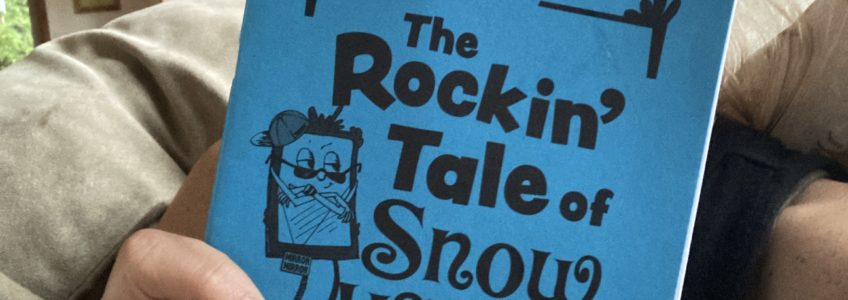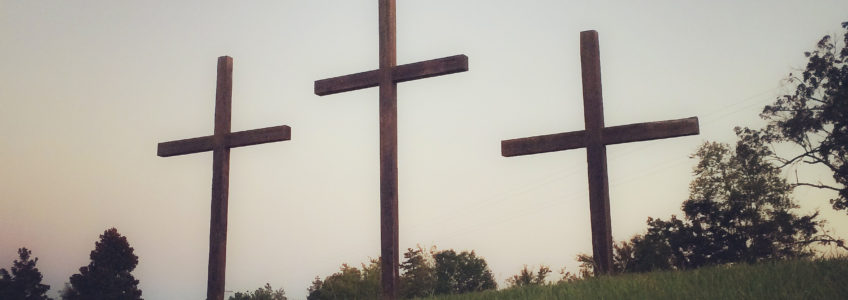Pro Tip: Read the Script (Learn from my humbling experience)
I really thought I was ready. They asked if I’d be the Lead for Backstage Team working Heidi’s play, The Rockin’ Tale of Snow White. I had helped backstage once before and really enjoyed it, so I was happy to step up and lead the team.
The week before tech week, I ordered the poster-sized list of scene synopsis for the green room. I made sure the backstage box had the glow-tape for spiking the set. I laid out all my black clothes so I’d have enough clean outfits for the 7 straight days of rehearsals/shows I’d be working. I carefully drew out the scene placements that the director had sketched for me. I even flipped through the script enough to write down the one-line cues that would mark the end of each scene.
I thought I was prepared.
And then, of course, it came time for the show to start and there I stood with the curtain rope in my hand and had no idea what to do. Hilariously, the music started, the actors danced … and I stood there idiotically with the rope in my hand and the curtain still closed.
Of course everyone laughed but I’m sure they’re thinking, “You had one job…” Ha!
Ah yes, I needed a headset. Of course. Ok. So I got a headset, and now I had the show caller calling sound, light, and curtain cues into my left ear along with occasional questions and comments from the crew kids coming from their headsets, while my right ear listened for line cues from the actors.
Ok, so I gotta listen to one thing in one ear, the other thing in the other ear, my face is smothered in mask (I cannot figure out why a mask makes me feel like I can’t hear but it does!) and I realized fairly quickly that maybe it’s my over-40-ears, but from backstage I can’t hear many of the lines.
Ok, it’ll be fine. I turn to check my trusty cue-list taped to the wall and wait … I can’t see it. Because it’s pitch black backstage. No problem, I’ll use my phone light. Left my phone in my purse out in the audience.
I’m in full-blown I-have-no-idea-what-on-earth-I’m-doing mode by now. As the show went on, of course changes were made on the fly:
“Oh, can you strike the stump after the pig dance?”
“Oh, the fire goes on and off after each scene with the evil queen.”
“Oh, the snow needs to fall during the King & Queen scene.”
I look hopelessly at my cue-list. Each scene is numbered. I haven’t the foggiest idea when the pig dances or when what queen is where. It occurs to me, again, that I am an idiot because of course when a play runs there is no one calling out, “Ok this is SCENE TWO, everybody! Got that?! Scene TWO.”
Thankfully, another mom was there, the Prop lead, who knew the story inside and out, and could help me along.
It worked out ok but I’ll tell you what, my anxiety was through the roof! Why?
Because I didn’t really know what was going on. I was always teetering on the brink of failure, never really understanding what was needed where. I felt anxious. Insecure.
And instantly I knew what I had failed to do:
I hadn’t actually read the Script.
In all my preparations, I had only focused on the list of things I was told to do. Sure, I had checked all the boxes.
But I didn’t know the Story.
And because I didn’t know the story, I didn’t really understand how to help. I didn’t understand how things fit together and what was needed when and how I could be ready to provide assistance best.
And in a mind-blowing (to me) revelation, I realized: This is what we feel like if we don’t read the Word of God.
We might go to church and get our bullet-point list: Five Ways to be a Better Spouse. Three ways to be free of anxiety. Etc, etc.
We take notes. We jot it all down. Great. But then we go home and stuff hits the fan and stuff happens that we totally didn’t plan for, and we don’t have a clue how it all fits together and suddenly I’m standing in the dark and there’s talking in one ear and other sounds in the other and I have a vague sense there’s a cue I’m supposed to catch somewhere but I have no idea what it is.
I’m an anxious mess.
Because while it’s fine to have a pastor pull out a few verses here and there, just like with the play, when we’re living life there is no booming announcement from heaven, “And now we’re going to be living out 2 Timothy THREE. Got that?! Second Timothy THREE. That’s the scene we’re at now.”
Anybody?
At least that’s my experience. It’s so tempting to only take in tidy sermons and five-minute devotionals, but if we don’t know the ARC of God’s STORY, we won’t really know what’s going on.
It is a STORY, right? The Bible is a story. It’s not only a list of commandments. It’s a story, and we’re part of it, and the story of Scripture is what MAKES SENSE of what we see in life. When I look around the world I can go, “Ah yes, that makes sense. This is all part of that big arc of God’s story. Man, it’s stressful now, but I remember that end scene that’s coming. It’s going to be good.”
When we don’t have a clear understanding of the ENTIRETY of Scripture, when we don’t know God’s Story, we are so much more prone to anxiety.
Knowing the Script gives me confidence. Gives me peace. I know how the story ends. It enables me to be WAY more helpful. When something unexpected happens, I can step in and help because I know how it’s supposed to go. I can help others who might forget a line or miss a set-change cue.
You know what else? I sure enjoy the play a whole lot more.
You better believe after that first awkward night I came home and read the Script. I’m still way behind everyone else, because I haven’t studied it. I have a very basic understanding of how it goes, but how much MORE equipped are the actors who have spent 10 weeks studying this thing, or the directors who have spent 10 months studying, preparing, and teaching the script.
You see where I’m going with this right?
I do not pretend to know all of God’s ways. He God. Me not. But after 23 times reading Scripture from cover to cover, plus doing innumerable Bible studies and teaching Scripture, I can testify that knowing the story of God gives us PEACE. I DON’T feel like I’m standing in the dark, hopelessly clueless, anxious and afraid. Sure, there will be twists and turns, there will be grief and difficult times, I’m even facing some right now. But knowing the story sure helps everything make a long more sense.
Even when it’s dark, we’ll know what to do.
{Thanks for reading.}
Life is a Funnel
Enter by the narrow gate. For the gate is wide and the way is easy that leads to destruction, and those who enter by it are many. For the gate is narrow and the way is hard that leads to life, and those who find it are few.
Matthew 7:13-14
Everything about the Kingdom is upside down. This means that life under the rule of Christ requires a constant reshaping of our hearts and minds, how we reason, what we value, how we make decisions. He says the way to find life is to lose it. He says the way to be rich is to give. He says the best way to overcome evil is with good.
And that the hardest path leads to life.
J. Vernon McGree (1904-1988) writes that a simple way to remember this is that life is a funnel.
The wide way, the way that feels comfortable, easy, spacious, free … actually narrows into restrictions, slavery, death.
The narrow way, the way that looks uncomfortable, limited, hard, constricting … actually widens into joy, abundance, freedom.
We can see this play out in all sorts of ways:
Choose the “narrow” road of self-control, eating carefully, disciplining our bodies through exercise, getting sleep and drinking water — this seems the limited, hard, constricting way. It seems so much “freer” to eat what we want, get up when we want, drink what we want. But how much more freedom and energy and LIFE do we experience when we have health and vitality and mental stability? The narrow way widens into life.
Or choosing the “narrow” way of abstinence before marriage, of following God’s clear plan for sexuality. It seems restrictive, limited, “narrow-minded,” but in the end it brings LIFE and abundance and health. The opposite “freer” way only brings more and more sorrow and disfunction.
It’s true of any addiction. The “freedom” to engage in whatever it is whenever we want however we want only ends in slavery.
The wide way narrows until it’s so tight you are trapped.
The narrow way widens until you find yourself running free.
God is the only Master who makes life better and freer and bigger the longer we go His way.
Of course He doesn’t give us a timeframe. It may feel narrow and hard our whole lives, but by faith we believe it’ll be worth it in the end. Someday, we’ll reach the end of the funnel and find the way so wide we could never have imagined its glory:
No eyes has seen, no ear has heard, no heart has imagined, what God has prepared for those who love Him.
1 Corinthians 2:9
Seeking the narrow path along with you, friends,
Kari
Can we agree in prayer when we don’t agree in person? {how to avoid yanking prayer}
What should our prayer focus be this month?
I asked Jeff this question, my fingers poised on my laptop, waiting for his response. Often, he doesn’t have strong opinions on things, but this time he had a clear answer right away:
Guidance.
Ah, yes. Guidance. We sent out the emailing inviting folks from our church family to gather and seek God together for guidance. And we let people know that if they were facing a situation where they needed God’s guidance, His direction, to let us know and we’d pray for them.
The very next morning, I was struck by the day’s Bible reading:
“Ah, stubborn children,” declares the LORD, who carry out a plan, but not mine, and who make an alliance, but not of my Spirit, that they may add sin to sin; who set out to go down to Egypt, without asking for my direction, to take refuge in the protection of Pharaoh and to seek shelter in the shadow of Egypt! … Woe to those who go down to Egypt for help and rely on horses, who trust in chariots because they are many and in horsemen because they are very strong, but do not look to the Holy One of Israel or consult the LORD! … The Egyptians are man and not God, and their horses are flesh, and not spirit.
—Isaiah 30:1-2, 31:1
In various places in those chapters it repeats again and again, Wait on the LORD. Rather than waiting on Him, they rushed ahead and took refuge in Egypt, making their own plan, trusting in what they could see instead of their God. What a warning!
This resonated deeply with me, as I had already sensed God saying to wait on Him. As I prayed through this, I kept seeing a picture of the Israelites, beside the Red Sea. God deliberately leads them into an impossible place:
“Then the LORD said to Moses, ‘Tell the people of Israel to turn back and encamp in front of Pi-hahiroth, between Migdol and the sea, in front of Baal-zephon; you shall encamp facing it, by the sea”
—Exodus 14:1-2
And in this impossible place, they wait. And we all know the story. Deliverance!
So we all resonate on one level with feeling like we’re stuck, or facing some impossible situation, and we don’t know what to do. So of course it’s easy for us to pray together in agreement!
But then … is it?
As I contemplated us all praying together, I have to admit, I had a bit of trepidation:
How do we all agree in prayer if we don’t all agree in person?
I don’t know if you’ve noticed, but there are a few varying perspectives on things these days. 😉 I am grateful that in our church family we have a very diverse mix of perspectives and viewpoints. While it has created a challenging past 18 months, I’m now honestly at a place where I’m grateful. I have learned a lot from people who see things differently.
But prayer can be tricky. It’s intensely personal. I remember nearly a decade ago, a gal left our church because she said our theological disagreement related to healing made it so we couldn’t pray in agreement together. I totally respect her perspective on that, and can understand how she felt. I blessed her as she found another church home.
But right now it seems there are many issues on which faithful believers disagree. At our house church recently, I sort of held my breath as we gathered in prayer, realizing that what some would see as a praise, others might see as terrible news, and vice versa.
And yet … as I sat there and watched I saw a beautiful thing unfold.
Genuine love. Unity. Comeraderie. Spirit-filled, agreement in prayer.
One person’s prayer request, I knew, ran counter to what some others would perceive as good. And yet, the others genuinely empathized, and lifted up heartfelt prayer. And it wasn’t shallow or fake, and also wasn’t what I call “yanking prayer” where we say a prayer but we’re really trying to yank the direction or focus over into what we believe is right. (Jeff jokes that pastors are great at this, “Lord, what my brother really means is that …”)
There was no yanking prayer!
I went to women’s Bible study, same thing — no yanking prayer!
We had our prayer meeting praying for direction — no yanking prayer!
And later, there was a remarkable answer to prayer, that even though one person’s perspective was perhaps different than some others, there was no doubt that God has come through in mighty ways on their behalf, and we can all rejoice over that! God knows the needs of His people!
Maybe what frees us from yanking prayer is the knowledge that God is big enough to handle all this. (FWIW: Certainly there is a place for loving confrontation, challenging people or appealing to them if we think they are in dangerous error or going astray. But group-prayer is not the place to do this.)
Here’s what I noticed: When we pray God’s Word, it’s usually not hard to be in agreement, even if we don’t agree on every current issue. If I’m lifting up a sister, regardless of whether I agree with her or not,
:: I can pray that she will be submitted to Christ in every area of life.
:: I can pray that she will know the truth.
:: I can pray that she will hear God’s voice clearly, and that God will direct her steps.
:: I can pray she will obey the Word of God and find light for her path.
:: I can pray that she will be free from fear and anxiety.
:: I can pray that she will love her neighbor as herself.
:: I can pray for God’s grace to be sufficient in her weakness.
:: I can pray she will be patient and long-suffering.
:: I can pray she will unwavering in her faith.
:: I can pray that God will provide everything she needs for life and godliness.
:: I can pray that she will open her mouth and proclaim to the good news of the gospel.
:: I can pray that as she seeks God’s kingdom first that all the things will be added to her.
:: I can pray for courage, wisdom, clarity.
:: Just as I pray for myself, I can pray she will kept from any error or deception.
:: I can pray she will have strength to resist temptation.
:: I can pray that her mind will be set on what is excellent, virtuous, and praiseworthy.
….I mean we could go on and on, right? When are are truly for people, we really won’t have a hard time thinking of lots and lots and lots and lots of great things to pray for them!
The challenge, at least for me, is when I’m overly devoted to my own perspective, I have a hard time setting it aside long enough to just pray God’s good Word over someone.
But I’m learning. I’m so incredibly grateful for my community where I get to witness godly men and women agree in prayer, even if we don’t agree on every issue. Lord, let your Kingdom come!
My grand vision of what we need most
Next month I get to co-facilitate the Women’s Ministry Roundtable sessions at the Harbor Network Leaders’ Summit in Louisville, Kentucky. Praying and preparing for this has had me thinking back through the 20 years I’ve been leading women in various ministry roles (Oh to go back and handle some things differently!), and also looking forward and seeking a renewed vision for the small group of precious women I help serve in our local church at Renew. Tonight, we’re gathering for one last summer hurrah around the fire-pit before the rains come and we’re all completely immersed in fall activities.
This summer has been a tremendously healing time for me, especially the last month. During late August, Jeff caught a bad cold, and so he took a Covid test and we all quarantined just to be safe. He tested negative, and he felt better within a few days, but because of the lag-time for testing and results, we ended up quarantining for six days.
It was glorious. No, that’s too weak of a word. It was life-changing. Even though we observe Sabbath every week, this girl needed a weeklong Sabbath and that’s exactly what I got. I actually extended it to 8 days just because I could. 😉
During those 8 days I still had four kids and a husband, I still had meals to cook and a house to clean. But there was time, stillness, hours and hours to sit by the creek, or lie on the couch and read Dune so I could converse with my Dune-obsessed son. Nerd that I am, I indulged in the incredibly satisfying activity of organizing all our books, cleaning closets, inventorying pantries. It was THE BEST.
But during those quiet days God was able to rewire some things in my heart and mind.
Right after that, I read The Visitation. Our son Dutch had been hounding Jeff and me for awhile, “You guys GOTTA read this book. Just read it!” He’d pick it up and put it on my lap if he saw me doing nothing. I had just finished Dune‘s 620 pages and I wasn’t quite ready to pick up the hefty Visitation comin’ in at 519 pages. Who has time for this?
One chapter in I knew exactly why he wanted us to read it. Without spoiling anything, the main character is a 45-year old pastor who quit the ministry because of all the heartache and pain he experienced. I would read and re-read paragraphs thinking, “That’s exactly how I feel.” The book explores some of the ways we inadvertently put expectations on God, how we mis-direct our hope, how we get so caught up in the “stuff” of church that we miss the goodness of God. It’s so, so good.
What does this have to do with vision for women’s ministry?
In The Visitation, part of the healing process for the pastor was when someone prompted him, “Give me some names.” He’s confused, asks for clarification, and the friend says, “Who are some of the people you’ve seen God work in and through.” He begins telling stories. Nothing spectacular. But they are evidences of grace. You can clearly see the goodness and power and mercy of God has he recounts simple stories of ordinary people.
Not events. Not spectacular experiences. Not “success.”
Through people. Like, ones with names.
Also this summer, I stumbled upon a tiny book (hooray for SHORT books) coming in at less than 100 pages. Eugene Peterson’s The Wisdom of Each Other. Wow. So, so good. And that is where the vision became clear, where all the loose ends of this year wove together to make a picture of what God invites us into as his children:
Friends.
My grand vision for women’s ministry in 2021: That we would be FRIENDS.
“No longer do I call you servants … but I have called you friends.”
-Jesus (John 15:15)
Greater love has no one than this, that someone lay down his life for his friends.
-Jesus (John 15:13)
Friends of God. Friends of each other.
That’s my vision. That’s my hope. In Peterson’s book, he highlights the importance of these spiritual friendships:
I was in a conversation recently with a group of friends and mentioned a chance encounter with an odd stranger in which I thought I had heard echoes of the Gospel. It had moved me deeply. One of my friends interrupted, “That sounds good, but I’d like a text for it. Where does the Bible actually say that?” I couldn’t come up with a text on the spot. Conversation stopped. A prayerful conversation was trashed because I was not conducting my part in it with the documentation proper to a Bible study leader.
This happens a lot. And so an entire world of “counsel” between friends is eliminated. Spiritual counsel, easy prayerful conversation between companions engaged in a common task, is less and less frequent. But when Jesus designated his disciples “friends” in that last extended conversation he had with them, he introduced a term that encouraged the continuing of the conversation. “Friend” sets us in a nonhierarchical, open, informal, spontaneous company of Jesus-friends, who verbally develop relationships of responsibility and intimacy by means of conversation. Characteristically, we do not make pronouncements to one another or look up texts by which to challenge one another; we simply talk out whatever feelings or thoughts are in our hearts as Jesus’ friends.
Often today we speak of wanting to see a Spiritual Director, or be Discipled in a formal setting. But as I’ve written about before, the most impactful kind of discipleship or spiritual-direction relationship I have ever experienced was with a women who insisted that we simply be “friends.”
Peterson’s book takes the form of a series of letters between friends. As he responds to his friend, he writes:
You seem disappointed that I am not more responsive to your interest in “spiritual direction.” Actually, I am more than a little ambivalent about the term, particularly in the ways it is being used so loosely without any sense or knowledge of the church’s traditions in these matters.
If by spiritual direction you mean the entering into a friendship with another person in which an awareness and responsiveness to God’s Spirit in the everydayness of your life is cultivated, fine. But then why haul in an awkward term like “spiritual direction”? Why not just “friend”?
Spiritual direction strikes me as pretentious in these circumstances, as if there were some expertise that can be acquired more or less on its own and then dispensed on demand.
The other reason for my lack of enthusiasm is my well-founded fear of professionalism in any and all matters of the Christian life….
Instead, why don’t you look over the congregation on Sundays and pick someone who appears to be mature and congenial. Ask her or him if you can meet together every month or so–you feel the need to talk about your life in the company of someone who believes that Jesus is present and active in everything you are doing. Reassure the person that he or she doesn’t have to say anything “wise.” You only want them to be there for you to listen and be prayerful in the listening. …
I’ve had a number of men and women who have served me this way over the years … when I moved to Canada a few years ago and had to leave a long-term relationship of this sort, I looked around for someone whom I could be with in this way. I picked a man whom I knew to be a person of integrity and prayer, with seasoned Christian wisdom in his bones. I anticipated he would disqualify himself so I pre-composed my rebuttal: “All I want you to do is two things: show up and shut up. Can you do that? Meet with me every six weeks or so, and just be there–an honest, prayerful presence with no responsibility to be anything other than what you have become in your obedient lifetime.” And it worked. If that is what you mean by “spiritual director,” okay. But I still prefer “friend.”
You can see now from my comments that my gut feeling is that the most mature and reliable Christian guidance and understanding comes out of the most immediate and local settings. The ordinary way. We have to break this cultural habit of sending out for an expert every time we feel we need some assistance. Wisdom is not a matter of expertise.”
I honestly believe that what this world needs most is simple and twofold: Friendship with God, and friendship with each other. First and foremost, we need to be reconciled with our Creator-Savior and enter into a living, abiding friendship with Him. And then, we need friendship with each other. That’s my prayer for this year.
Stillness, when the world is raging

The temperature is perfect, I’m settled into an Adirondack chair, wind chimes gently tinkling, the trees around the deck swaying softly in the warm breeze, leaves rustling ever so slightly. It’s Sabbath. All the housemates are gone. Jeff and Dutch are gone. Ben is asleep. Justice is settled in his own child-size Adirondack chair, watching the leaves and birds and bugs. Heidi is kneeling on the deck, watercolors spread on a wooden bench in front of her, painting. Justice just looked up and said, “Mommy, I love you.” Occasionally, a goat softly bleats, a chicken clucks. It’s so quiet.
This never happens, you guys. But it is now so I’m seizing this moment to say hello.
I’m a little rusty at writing. It’s been so long since I’ve written a post here I actually forgot my password.
A few weeks ago I wrote in my journal: I feel like I’m emerging from a hole, maybe a bomb shelter? That was the only entry for that day — my journal isn’t impressive, scraps of thoughts and prayers and Scriptures sprinkled into the few moments my arms are free each morning before the littles awaken.
What an interesting 18-months we’ve had, yes? And we continue to have … I’m not here to provide any commentary on current events (although I’m grateful for the thoughtful Christ-followers who are), I’m just hoping to get back in the rhythm of sharing nuggets of the Sacred in the midst of my mundane. I’ve mentioned before, I don’t know what I think until I write. For me, writing is therapy. Writing is processing. Writing is healing. Fourteen years ago this blog began because it was a dark season and Jeff knew that writing would help my heart. I haven’t outgrown that. It still does.
But oh my goodness, life is so full. The past five years have brought four family deaths, a precious friend’s son’s death, three miscarriages plus two babies (!), a global pandemic and unrest, historic wind and wildfires, an ice-storm, power outages, and significant shifts in close relationships. Notice that not all these things are bad. But they are taxing.
We the people are tired.
And so I Sabbath. Why? Because our King tells us to Sabbath, and every Sabbath reminds me that I am not in control of this world. It reminds me that I am weak and He is strong, and for 24 hours every week I remind my soul: There is a God. It is not me.
Without Sabbath I would miss the breeze and the wind chimes and I might even miss the smell of sweet apples in the garage waiting to become applesauce. Without Sabbath, I know — I would get tricked again into believing it all depends on me and if I don’t hold back the darkness what’re we going to do?
Last night we prayed. We gathered. Just a dozen of us but it doesn’t take many. We sat outside in a circle, in mis-matched lawn chairs, the babies on a blanket. We prayed near and far. From our own needs, precious to God, to the Afghan people, equally precious. We read Scripture. We sang. We laid hands on each other. We believed.
And I kept thinking that those 2+ hours were probably the most effective moments of my whole month. I kept thinking, “Why do I not do this more often? Why does everyone not doing this more often? This is our best work!”
So still. So many moments of complete silence. And yet with every ounce of my being I know work was accomplished. God is not limited by time and space. My mind blows all over again at the realization that I can actually help people on the other side of the world when I pray.
Sabbath stills us long enough to pray. We slip off the crushing yoke of believing we have to have this all figured out and having the RIGHT STANCE on every single issue RIGHT NOW.
I forget that prayer is actually super forgiving. Like, if I say the wrong thing on social media I will be crucified. But if my heart is turned toward God and I lift up what I think would please him as best as I know how, He can work through my efforts and bring His kingdom, even if I’m somehow misguided.
Glory hallelujah! Isn’t that good news, guys?
There’s so much I don’t know. God’s given me some pretty clear directives; I’m obeying those. Outside of that … I don’t know. I pray. I don’t feel like I fit comfortably into any “camp” these days. I’m not this-enough for these people and not this-enough for these people. Anybody else?
Haha, I guess it’s high time I realized I’m not enough of anything, ever. Goodness sakes, thank the Lord that He is enough!
And that’s what Sabbath says: God, you’re enough. I’m sure not. You are.
I saw a quote the other day that read:
No matter what is happening in the world, have your tea, make your list, plan your food preparation, read to your children, wash the clothes, do something creative for everyone and be a light in your home.
I love this, because while it’s not about Sabbath, it’s a recognition that no matter what is happening, there is probably someone you can serve, love, nurture, teach, help … right in front of you. Not advocating me stick our heads in the sand, good grief not at all, but we can sure get sucked into the joy-destroying trap of over-focusing on what we cannot control and overlooking that which we can.
So today, I’ll Sabbath. I’ll enjoy this stillness. Ben’s nap is almost over. Justice is eager for interaction. The chickens have gotten into my raised beds and are eating the kale. It’s time to sign off. But my goodness I’m grateful for this weekly rhythm of silence, slowing, of reminding my Soul that it really is ok to just stop.
O Lord, my heart is not lifted up;
my eyes are not raised too high;
I do not occupy myself with things
too great and too marvelous for me.
2 But I have calmed and quieted my soul,
like a weaned child with its mother;
like a weaned child is my soul within me.3 O Israel, hope in the Lord
Psalm 131
from this time forth and forevermore.
Intentional Mediocrity: Making your Not To Do list
“Anything worth doing is worth doing badly.” -GK Chesterton
Okay, this quote doesn’t top the charts of most-inspiring, but this idea has helped me immensely through the last 15 years of motherhood, homeschooling, and juggling the never-ending demands of ministry life.
Like you, I’ve been asked many times: “How do you do it all?”
And my answer is always: “I don’t.”

On those glass-is-half-empty days, when I’m discouraged and my perspective is skewed, I feel as though I don’t do anything well.
Dinner’s made, but it’s chicken and rice again. Laundry’s done, because I no longer fold. Kids finished school because I told Heidi to skip the Base 2 math problems (again). The house is tidied but the sliding glass door has so many smeared handprints I can barely see through it.
But eventually I remind myself of Chesterton’s wisdom and the power of intentional mediocrity.
Truth: We can’t be awesome everywhere.
I remember reading Michael Hyatt’s book Platform years ago, where he teaches the importance of exceeding customer’s expectations, of “baking in the Wow” to every aspect of your business. And I remember writing this realization in my journal that day:
“I can’t be awesome everywhere. I can’t ‘bake in the Wow’ in every area of life.”
Truth: Some things have to be neglected.

Sadly, many people only “bake in the Wow” in the business world, or in the areas of life that are visible to others, but neglect the hidden places, the small people, or the health of their souls. We’re all in danger of mis-prioritizing which areas are worthy of Wow.
We’re wise to give it some consideration so we don’t drop the ball on what really matters.
Our task as parents and home-educators is to thoughtfully and intentionally choose where we will “bake in the Wow” (i.e. focus our attention) and where we will deliberately and confidently choose mediocrity.
If we don’t do this we’ll be enslaved to perfectionism, or convinced we must be failing since not everything is awesome.
One simple exercise that can help: A well-chosen Homeschool Not To Do list. {Read the rest over at Simple Homeschool…thanks!}
Y’all are the body {PODCAST}
Scripture tells us that we (plural!) are the body of Christ (singular). What does this mean? Well, because God created the world, the entire world serves as an illustration of theological truth. So as we look through the Word AT the world we see a beautiful picture of what oneness is like. Join me for Episode 33 as we dive into what ONENESS really is and how we can learn from His created world to be more of what HE intended us to be. Read More
Still Here! The GOOD News {PODCAST}
I recently received an email from a dear sister in Christ walking through a difficult situation in her local church. Her pastor resigned, so worn down from the strife and conflict. Many people have left. She’s feeling tired and alone and it got me thinking it’d be good to talk a bit about the Second Mile as it relates to church unity and navigating difficulties together as the body of Christ. So here we go! Join me for Episode 32 as we dive into God’s heart for His church, and how the Second Mile enables us to be ONE heart, one mind, united in our one glorious purpose.Read More
Wistfully
I remember my freshman year of college, when I first started really following Jesus — I remember missing my old boyfriend, and keenly feeling that aching torn-between-two worlds feeling. I wanted Jesus more than anything. But there were days I looked wistfully at my old life.
Now, 23 years later, I can see how silly it was to long for what was gone because God had so much more in store for me. There’s no comparison. Life has had pain, for sure, but also blessings beyond what I could have then imagined.
A couple years ago I wrote a song. I have written exactly one song in my life, and this is it. 😉 I wrote it before any of our latest global adventures began. It’s called The Narrow Road. The verses go like this:
Lord, here’s my heart. Divided and Torn. Part wanting my way, part wanting yours. Make it undivided. Make it whole again. Lead me down the narrow road.
There is a wide way that seems right to man, but it leads straight to death, again and again. It’s your kindness, I know, that turns me around, to go down the narrow road.
My flesh hates restrictions, hates feeling bound, but I know your commands, Lord, are where freedom’s found. I submit to your plan, I relinquish my rights, I’ll go down the narrow road.
Put my hand to the plow, and I’ll look straight ahead; Remember Lot’s wife, let dead bury dead. ‘Cause your promise is sure, and nothing compares, I’ll go down the narrow road.
All this world offers, I’ll count it as loss. Deny’s self’s demands, and take up my cross. ‘Cause your way leads to life, abundant and true, I’ll go down the narrow road.
Then on that day, when I reach journey’s end, I’ll meet with my Maker, my Savior, my Friend. He’s the way, truth, the life, He’s the only Door, to joy in its fullness, pleasure evermore.
The chorus goes:
I look wistfully at the road that is wide, then I remember why my Savior died. And the life I now live, is Christ crucified, I’ll go down the narrow road.
I had forgotten all about this song, until today when I was reading John Piper’s words today:
One of the great temptations to keep us from fulfilling what Jesus calls us to to do is that we grow weary in the battle and look back on how easy life was before we started to follow him. Strive to enter through the narrow door means, fight for perseverence. … In other words, one of the factors that makes the door to the Kingdom of God narrow is that striving to enter must last to the end. Therefore, Jesus warns us against nostalgia for the former days of worldliness. He says that the stress of the last days of this age will tempt people to look back. So with stark simplicity he warns, “Remember Lot’s wife” (Luke 17:32) … Striving to enter through the narrow door means taking heed to the warning of Jesus: “No one who puts his hand to the plow and looks back is fit for the kingdom of God” (Luke 9:62).
What Jesus Demands From the World, P. 177
This pandemic has left many of us wondering, “What does it mean to ‘go back’?” I don’t think we can go back. Because the world is different. We are different. And God is doing His thing, as always, and invites us in, but there is always this temptation to look wistfully at “the old days.”
When the days drew near for him to be taken up, [Jesus] set his face to go to Jerusalem.
Luke 9:51
This week we remember Jesus’ movement toward the cross. As the days drew near, he “set his face” in the right direction. No reminiscing about wine at weddings. No wistful remembrance of the “good ol’ days.” No bitterness that his once-friend Judas was about to betray him.
He set his face.
Lord, set ours.
Do Good {PODCAST}
Doing good: That’s what the Second Mile is all about. Instead of dwelling on the stinging cheek, we move forward and offer the other. Instead of throwing ourselves into defending our rights and our stuff, we let go of the tunic and offer the cloak. Instead of huffing and puffing over that first unfair mile, we lift our eyes to the One we really serve and with a little hop in our step we go not just one, but two.
The joy comes in the doing good.Read More








